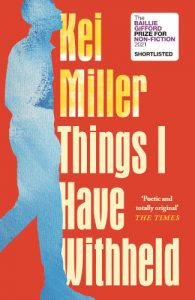Kei Miller’s collection of essays Things I Have Withheld takes the measure of what it means to read and be read as raced, writes Wamuwi Mbao.

Things I Have Withheld
Kei Miller
Canongate, 2021
The past decade’s reading landscape has been peopled comprehensively by collections of omnivorous creative non-fiction from hard-pressed novelists, impatient anti-narrativists, anxious listicle-jotters, forgotten literary wonders and masquerading self-help Svengalis in social justice mufti. It’s a needy genre of writing that feels informative because everyone speaks in the same voice: the same confiding oversharing; the same aren’t-I-clever display of facts pleasantly arranged like gastronomic plating. But what compels initially will later become beseeching. Don’t all the importuning titles (Why I’m Not Speaking About What We Need to Talk About When We Talk At Once) sound like they’re trying to badger you out of your incuriosity?
This may account for the comparative neglect that has greeted Kei Miller’s collection Things I Have Withheld. Miller is a Jamaican poet and essayist, and his collection is a bricolage that takes the measure of what it means to read and be read as raced, in the context of an incontinently hostile or unrecognising world. While this collection is associable with much recent writing around racism and the torsions it wreaks on different societies, Things I Have Withheld has a deeper historical texture that comes of setting itself somewhere different. Miller’s supple, open-handed writing feels less anxious than the internet-refresh-cycle sensibilities that have become a fixture on the sad scene of writing about the world’s ongoing race problem. But more appositely, its finer graining acknowledges an easily elided fact: that race and colour can be arranged differently in relation to the mendacious rootedness of racism depending on where you are in the world. Miller asks questions about what racism means in a society like Jamaica, where shadings and colour gradations intersect with rooted racial imaginaries in particularly local ways.
I point this out because the discussion about Black Life as a socially endangered thing has in recent years been dominated by a strain of American writing that tends to stare into its own reflection like Narcissus before the pool. Much of this writing attempts to think with the prevailing disorientation of social violence, but because its writers are often infiltrated with the solipsism that tends to filter inexorably into North American writing, their triumphant conclusions often seem commonsensically simple. And because North America occupies all its positions in the public writing world very loudly, it drowns out other voices from other rooms. You probably haven’t seen anything about how Black people encounter living in Australia, or in Sweden, or in Japan, and if you have, it won’t have been hailed in the same laudatory way as the pervasive stream of vital tellings coming out of North America (or England, for that matter).
I have a great deal of time for Miller’s work, even though the showcase piece in this supple and intriguing collection is ‘Letters to James Baldwin’. Although the Tupacian principle—that it quickly becomes a threadbare conceit to hold conversations with people who cannot speak back—looms, this essay proves unexpectedly personal-scaled and less performative than you might anticipate. Miller writes fluidly of ‘the experiences that we must hold outside ourselves if we are ever to write them and not be broken by them’. The letters are a pointillist tapestry that addresses the question of why to write essays at all:
I think about why I write essays—as an antidote to distance, as a cure to what stretches between my best self and my worst self, or between my friends, however close we are—the people I laugh with, the aunts who I kiss, the men I have kissed, the people I love, the people who want to be good people, who try every day to be good people, to do good things, but how so often between us, between our love is this black and white world, these truths that, by and large, I do not say and by God, we do not want to hear.
This, I think, captures what makes Miller’s writing so good. Rather than being led about by the tow of theory (‘Here Is How This Thing That Happened to Me Relates To This Theory’), the writing in this collection works at the level of people and their close, brushing, often wounding interactions. He invokes Baldwin (yes), but also Virginia Woolf and Branden Jacobs-Jenkins, and he weaves them into a set of reflections that feel commensurate with their subject matter, namely Blackness and the shades of being that give or deny it meaning.
Miller’s earlier work has treated the social fissures opened by the intersecting seismic workings of race and class. His startlingly vivid 2016 novel Augustown quilted a patchwork story of a fictional not-quite place where divisions along racial, religious and cultural lines structure the lives and stories of a tangle of characters. In the emblematic essay from this collection, ‘Mr Brown, Mrs White and Ms Black’, Miller does something whose simplicity is deceptive. What outlines this work is three people getting ready for a dinner party. What fills it in are the light brushstrokes of each character’s racialised experience of the world, and the way each character flashes between anger, puzzlement or sadness gives the piece its moreish character. Each character has room to muse on the iniquities of race in their lives: ‘Race, it seems to Mr Brown, is not so much what you are, as it is what people have decided that you are—what it is they see in you, how they make sense of you.’ At another point Mr Brown peels back the central crux of what happens in a country where, it is assumed, racism no longer exists in any tangible way:
When it comes to racism in Jamaica, it’s like the most sophisticated racism in the fucking world. You could almost not see it at all. Listen man, no teacher in Jamaica is going to tell a little girl in school: come on little miss, you need to start behaving like white people. No Sah! The teacher is going to say instead: you need to start behaving like a young lady. And the teacher will tell a little boy: you need to start behaving like a gentleman. And then we cuss people how them talk bad or them look unkempt … and all these things that we say every goddamn day is really the way that we have learned to say something else—that we not acting or looking or behaving white enough.
The piece has the pace of allegory, while conveying something weightier about how people read and are read by each other. It had me wishing for a book length version of their loosely intertwining stories.
Elsewhere in the collection, the author muses on the slow unfurling of a long-kept family secret; a dimly remembered figure from family gatherings turns out to be part of a tangled family history of confession and withholding that implicates all the family in a story of shame and the shared burdens women are left to shoulder. Miller tells the story with sympathy and grace, ending on a plaintive questioning note about whether some secrets are what holds a family together. His basic rhetorical unit is the meditative, wondering sentence, and that provisional, questioning earnestness somehow feels less cynical and less Let-Me-Tell-You-How-It-is than some other efforts in this genre.
In another essay, Miller goes on a night tour with some Kingston rentboys, one of whom tells him that the key to evading police attention is simply, when confronted about why they are out so late at night, to say that he is gay:
And you see, when you say that now, well … dem will let you go. Dem don’t want to hold onto you after that. And you see, this is Jamaica. Nobody not going to claim say dem is a battyman if dem is not really a battyman.
It may be taken as a sign of how essays work that the moments that resonated most personally with me were the ones where Miller talks about the odd wariness one must internalise as a Black person moving about in worlds where one’s colour marks one out for forms of mistreatment, where we are called upon to explain ‘our spectacular presences in places we are not easily imagined’. It is of a piece with art forms like Santan Dave’s Psychodrama concept album as a creative work that alchemises the personal experience of Blackness into something deeply transportive.
So perhaps the needfulness of the essay as a mode of public writing conjures up a necessary narcissism in its reader. Reading Things I Have Withheld feels like one is being confided in, with all the privilege that such trust carries. At a time when many similar collections feel wearying in their exhortations, Things I Have Withheld feels less claustrophobic, and is worth reading because it doesn’t insist on its own urgency.
- Editorial Advisory Panel member Wamuwi Mbao is an essayist, cultural critic and academic at Stellenbosch University. Follow him on Twitter.





